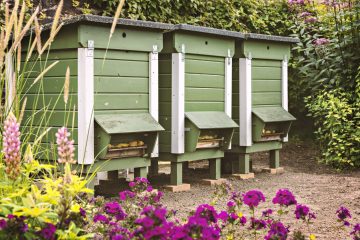Last Updated: 23 December 2025
There’s no doubt about it- the world needs bees. In fact, bees’ pollination helps more than 30% of the world’s crops and 90% of wild vegetation to thrive.
In short, without bees, humans wouldn’t have many things to eat. And with bees dying at an alarming rate over the past few years, just take a look at the total winter colony loss within the USA from 17/18 at beeinformed.org, it’s no wonder that some generous people have set their minds on beekeeping.
And the best part is that this great work isn’t just for those of us that live in the countryside. Urban dwellers can create a thriving home for bees as well!
Are you interested in becoming an urban beekeeping, and learning more about how you can be a part of this urban solution? You’re in the right place.
Keep reading to learn everything you need to know about urban beekeeping for a successful future.
Let’s get started!
Table of Contents
Urban Beekeeping: What to Consider?
Zip Code
Did you know that beekeeping is illegal in certain locations? It’s true, and unfortunate for those aspiring urban beekeepers!
Although many cities are loosening their laws in regards to beekeeping, you will still need to look into whether or not it’s legal in your zip code. Make sure to do your research before taking the first steps in creating your hive to avoid any trouble.
Location Matters for Beekeeping
Once you’re sure that you’re ready to commit to beekeeping and keeping bees for honey production, start by scouting out the best possible location. A backyard beekeeping area will do just fine.
When selecting the exact position for your hive, keep these tips in mind.
Give Your Bees Space to Work
A great general rule of thumb is to give your bees a 10-foot radius around their hive to do their thing. It’s also important to face their hive away from any activity that may occur daily around your or your neighbours’ properties.
Think of your urban beehives like an airport. These little friends will be taking off and landing all day long, and this will generally happen in the direction you face them. So, help them out, and give them plenty of space to start and complete their missions.
If you don’t have the proper amount of space for your bees and the surrounding humans to live in harmony, consider elevating the situation. A rooftop hive is a great option- your bees will have plenty of space and you’ll avoid any unwanted contact with them.
Give Yourself Space, Too!
Just like space is important to consider for your bees, it’s also important to consider for yourself.
You’ll need plenty of room to be able to maneuver around the side and back of your beekeeping equipment. If you block their entrance, it will create many ruined flight plans!
Remember that you will need to use lots of your own space to create enough room for your bees to thrive, and for you to have space as well. A five-foot by five-foot area is recommended.
Some people may want to keep their urban hive in their backyard, and others may want rooftop hives… What’s important here is that you have enough space.
Consider Nearby Lights
If you or your neighbors have lights that illuminate based on sensors, take this into consideration while choosing a location for your hive.
Sometimes, bees will fly toward bright lights at night. This is because of a “positive phototactic” response in them, which disrupts their usually dormant nighttime state.
This is both harmful to your bees (they’ll fly around the light until they die from overexerting energy) and annoying for you and your neighbors. So make sure that you do a thorough investigation of your and your surrounding properties before taking on the responsibility of beekeeping.
To avoid finding hoards of dead bees on your porch each morning, ensure that your hive’s entrance is facing away from any nighttime bright lights in the immediate area.
It Takes a Village
You might not be so delighted with it, but in order to have a happy, healthy, thriving bee colony, you will need happy neighbors. And the best way to ensure that they are happy is by using preventative measures.
But if you can’t contact every single person and word travels, don’t worry. Usually, telling people that you’ve been beekeeping for however many months without any issues will quell their initial worries.
Predict possible issues, using your knowledge of both your neighbors and their properties. You’ll be shocked at how supportive most people will be if you consider their safety and wellbeing at all times.
Wondering how to achieve this? Just follow these tips.
Provide a Water Source
It’s simple. If you don’t give your bees a source of water, they will look for it elsewhere, possibly at your neighbor’s expense.
To keep your bees away from your neighbors’ dog bowls and swimming pools, create an attractive water source on your own property. But take care! Bees can be choosy when it comes to where they get their water from.
Give ‘Em Some Honey
Is one of your neighbors having trouble warming up to the idea of a beehive being so close? Or did they have a run-in that resulted in a sting?
Use your neverending flow of honey to your advantage! Once your neighbors taste how delicious the fruits of your labors are, they’ll forgive any past negativity and their support will grow.
Use Education for Prevention
Just one of your neighbors using pesticides on their plants can kill your entire hive. To keep this from happening, you must educate them.
Handing out flyers is a great way to do just this. You can both encourage your neighbors to plant flowers and also to not use pesticides through these flyers. Be specific, letting them know that they just need to avoid these chemicals while their plants are flowering.
Wrapping Up
As you can see, urban beekeeping involves lots of planning, consideration, and hard work to pull off successfully. But if you follow the tips above, you’ll be helping the world to become a better place! Urban beekeeping is really taking off, all over the world, with our friends at afrenchcollection showing that businesses, hotels, restaurants, and tourist locations are adopting this, in the hope to look after bees and inspire others to do so.
Just remember to give your bees plenty of space and water, and to consider your neighbors’ feelings and needs at all times. And, of course, to share your delicious honey!
If you’re interested in buying a hive to get started? Check out some options here, with our beehives for sale or even our range of recommended beekeeping starter kits, just make sure that you remember to wear a bee suit when beekeeping. After all, maintaining your personal safety is the ultimate priority.

